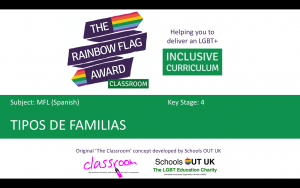
An LGBT+ inclusive lesson – Clara Marmo
The Educational Professional Studies element of our secondary PGCE encourages our trainee teachers to consider the wider aspects of their role as teachers. One main focus of critical reflection within the programme is on equality, diversity and inclusion and how this can influence the beginning teacher. Clara Marmo (MFL student teacher 20/21) writes below:
Upon attending a lecture in Educational Professional Studies (EPS) on LGBT+ inclusion by Rachel Williams from the Proud Trust, I felt inspired as a trainee teacher to actively transmit a message of inclusion, respect and pride to my students.
After having a look at the Rainbow Flag Award website, where they display a series of lessons organised by Key Stage and subject, I noticed that there were not any Spanish lessons available – I immediately knew that I wanted to change that, and asked Siân Morgan, the University of Manchester’s EPS coordinator, for her support in contacting the Proud Trust about a possible collaboration.
I was put in contact with Amy Fielder, the Proud Trust’s LGBT+ Education Development Officer. I was very happy to know that they were as excited as I was about this collaboration! Amy sent me the template lesson plan that they use and helped me get started. See the end of my article for a comment from Amy.
The Proud Trust’s lessons have one thing in common: they follow the national curriculum’s content and cover an LGBT+ inclusion topic at the same time.
Before planning the lesson, I knew that I wanted to find an authentic resource as a starting point. In the languages classroom, authentic resources are defined as content created for native speakers, and not for language educational purposes. In my opinion, it is key to present students with authentic resources to give them a taste of the content that real native speakers consume and put the language in a greater, cultural context.
The authentic resource that I chose is a children’s book. I think that carefully chosen children’s books are ideal for language learners: they provide authenticity in an accessible way – and with images!
The book is called Mi familia es de otro mundo (“My family is from another world”) by Cecilia Blanco, published by Ediciones Urano. This book provides a new insight to families that goes beyond LGBT+ representation and covers inclusion as a positive concept. That is why I chose to plan a KS4 Spanish lesson about the topic of types of families.
As a teacher, I want to create an environment where all students and their experiences are validated; and where they can learn the value of respect and inclusion. As teachers, our task goes beyond teaching a subject; however, we can achieve this while following the scheme of work for our subject.
The topic of “family” is often taught in a non-inclusive, outdated way. Textbooks often limit this topic by only presenting a traditional family with a married couple of husband and wife, implying that it should be the norm. However, this model only presents a limited perspective of what a family can be and does not represent other families, such as single and divorced parents, and those within the LGBT+ community.
As language teachers, we should provide students with the tools to talk about things that matter to them and that they can relate to. If we only teach about “traditional families”, it is most likely that at least one student in the classroom will not be able to relate and might feel that their experience is not relevant enough to be mentioned. More importantly, it sends a message to the students that we care about inclusion, and that it is important to talk about it positively. See my lesson guidance and slides for more detail.
As Amy Fielder, the Proud Trust’s LGBT+ Education Development Officer, pointed out, “the creation of an LGBT+ inclusive lesson will help to establish a safe and stimulating environment for pupils, rooted in mutual respect, and demonstrates the positive attitudes which are expected of pupils. By discussing LGBT+ identities and families in a positive manner it helps to create a space where LGBT+ young people feel safe and respected and demonstrates to non-LGBT+ students that the teacher feels positively about these identities and LGBT phobia will not be tolerated.”
I am grateful to the Proud Trust for allowing me to collaborate with them, and I hope that my lesson will be of use to many teachers!
Amy Fielder (The Proud Trust) writes:
I was very excited to hear from Clara in regard to developing the languages lessons we have on The Rainbow Flag Award Classroom. For too long LGBT+ identities, people and history have sat in a lone PSHE lesson, that has helped to further the idea of there being an ‘us’ (cis, heterosexual people) and ‘them’ (LGBT+) people. The Classroom aims to support teachers in usualising LGBT+ identities, removing this idea of ‘us and them’ and proactively tackling discrimination.
Clara’s lesson is a fantastic way of usualising different family structures whilst teaching new vocabulary and conjunctions. Lessons that represent the diverse identities of our society are so important, all young people should be able to see themselves represented in your teaching.
We very much believe that by working with teachers and developing resources that positively represent and include minority communities we can support young people in breaking down barriers, we can work towards eliminating discrimination and we can improve relations between people of different identities and communities.
If you are interested in exploring Clara’s lesson and others like it, you can join The Rainbow Flag Award Classroom for free and download all of the lessons completely free of charge here https://www.rainbowflagaward.co.uk/the-classroom/
If you would like to know any more about our work, or you have a lesson or idea that you feel would fit The Classroom, please get in touch: amy.fielder@theproudtrust.org





0 Comments